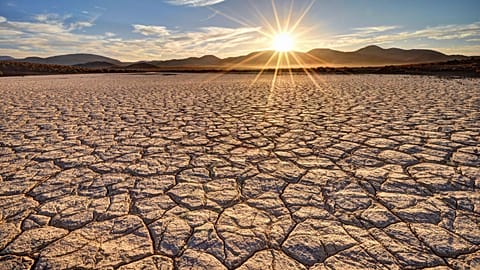The Copernicus Climate Change Service said the global average temperature for September broke records by such an absurd margin that climate experts are struggling to describe the phenomenon.
After a summer of record-breaking heat, the abnormally hot weather continued into September setting a new mark for the level above a normal temperature for the time of year, the European Union's climate change agency reported today.
 ADVERTISEMENT
ADVERTISEMENT
 ADVERTISEMENT
ADVERTISEMENT
Last month’s average global temperature was 0.93°C above the 1991-2020 average for September. This is the warmest margin above average for a month in 83 years of records kept by the Copernicus Climate Change Service.
“It’s just mind-blowing really,” said Copernicus Director Carlo Buontempo. “Never seen anything like that in any month in our records.”
While July and August had higher temperatures because they are warmer months on the calendar, September had what scientists call the biggest anomaly, or departure from normal. Temperature anomalies are crucial pieces of data in a warming world.
“This is not a fancy weather statistic,” Imperial College of London climate scientist Friederike Otto said in an email. “It’s a death sentence for people and ecosystems. It destroys assets, infrastructure, harvest.”
Copernicus calculated the average temperature for September was 16.38°C, which broke the old record set in September 2020 by a whopping half-degree Celsius. This is a huge margin in climate records.
The hot temperatures stretched across the globe. They were chiefly driven by persistent and unusual warmth in the world’s oceans, which didn’t cool off as much in September as normal and have been record-breakingly hot since spring, said Buontempo.
Earth is on track for its hottest year on record, about 1.4°C warmer than pre-industrial times, according to Samantha Burgess, Copernicus’ deputy director.
This past September was 1.75°C warmer than the mid-1800s, Copernicus reported. The world agreed in 2015 to try to limit future warming to 1.5°C warming since pre-industrial times.
The global threshold goal of 1.5°C is for long-term temperature averages, not a single month or year. However, scientists still expressed grave concern at the records being set.
“What we’re seeing right now is the backdrop of rapid global warming at a pace that the Earth has not seen in eons, coupled with El Nino, a natural climate cycle that’s a temporary warming of parts of the Pacific Ocean that changes weather worldwide," said US climate scientist Jessica Moerman, who is also president of the Evangelical Environmental Network. “This double whammy together is where things get dangerous.”
Though El Nino is playing a part, climate change has a bigger footprint in this warmth, Buontempo said.
“There really is no end in sight given new oil and gas reserves are still being opened for exploitation,” Otto said. “If you have more record hot events, there is no respite for humans and nature, no time to recover."
Buontempo said El Nino is likely to get warmer and cause even higher temperatures next year.
“This month was, in my professional opinion as a climate scientist, absolutely gobsmackingly bananas,” climate scientist Zeke Hausfather said on X, formerly known as Twitter.



















